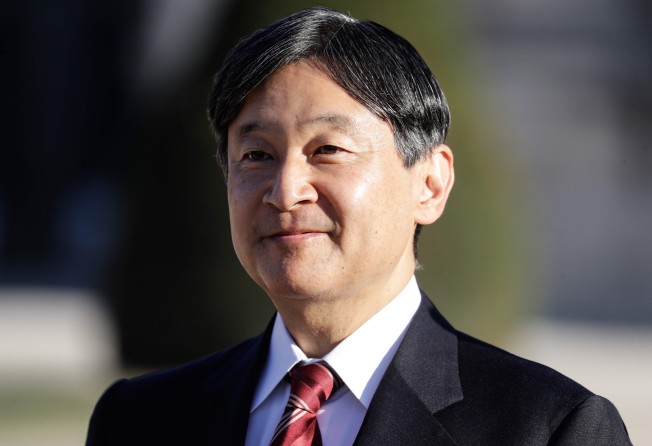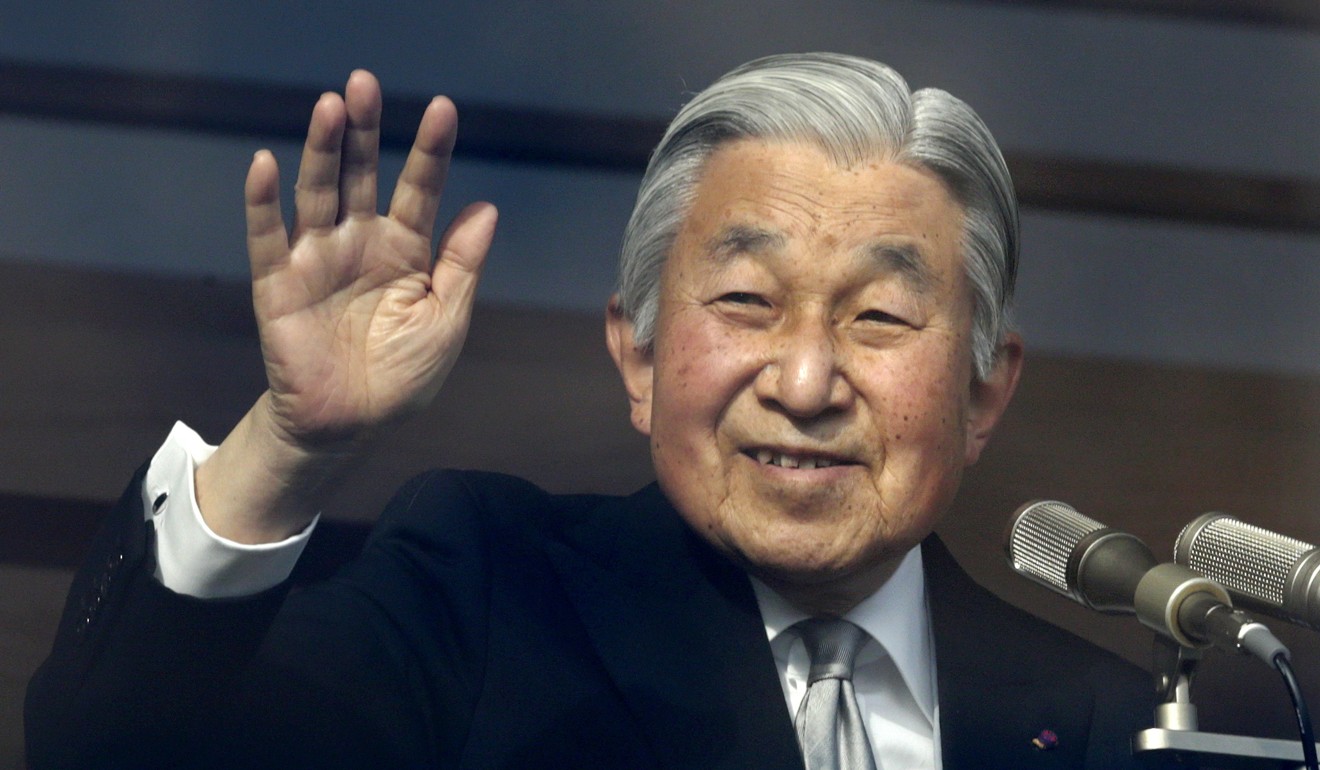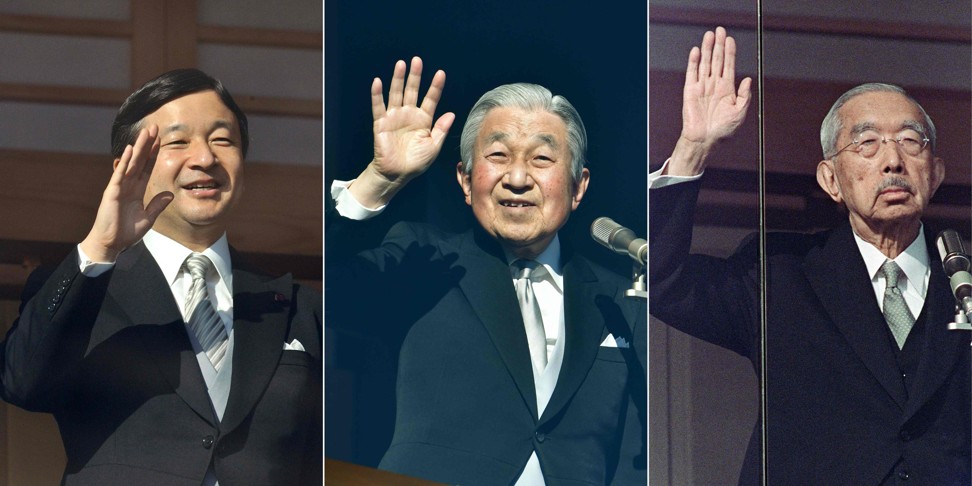Japanese emperor abdicates: what to expect from Naruhito in the new Reiwa era
- Japan’s crown prince will on May 1 transition to become emperor, a role for which he has been groomed since his birth 59 years ago
- He will draw from his father’s experience and popularity, but the Oxford-educated royal is expected to have his own opinions and style of rule

When Naruhito transitions from crown prince to emperor on May 1, he will assume the role for which he has been groomed since his birth 59 years ago. Like his father, grandfather and previous Japanese monarchs in a lineage that goes back to the year 660, Naruhito will carry the hopes and expectations of a nation on his shoulders.
After he assumes the role of tenno – or “heavenly sovereign” – Naruhito will inevitably draw on the advice and experience of his own father, Emperor Akihito, who will resign a day before his oldest son ascends the Chrysanthemum Throne.
But the new monarch will be acutely aware Japan and the wider world are very different places from when his father was enthroned in January 1989.
“Emperor Akihito has received great support from the Japanese people throughout the Heisei Era,” said Hideya Kawanishi, an associate professor who specialises in Japan’s imperial system at Nagoya University. “The new emperor will also be required to reflect the people’s opinions and he has a serious character, meaning that he will work hard to meet his subjects’ expectations.”
That much he has in common with his father, who earned genuine affection from the public for a personal touch and the numerous times he visited parts of the country hard-hit by natural disasters, including areas of northeast Japan after the March 2011 earthquake and tsunami.
The image of the emperor and empress on their knees in evacuation centres and talking to people who had lost everything were etched on the nation’s collective memory.
“But the atmosphere as we enter the Reiwa era has changed from Heisei, so I believe the new emperor will also have to change his behaviour, while I also think he will express his own opinions in order to meet the expectations of the people,” said Kawanishi, author of a number of books on the imperial family, including Emperor Akihito and Post-War Japan.
Jun Okumura, a political analyst at the Meiji Institute for Global Affairs, said Naruhito will preserve elements of his father’s rule that won him admiration – and that he and Prime Minister Shinzo Abe, who has never made a secret of his conservative stance, will both go out of their way to keep a respectful distance from one another.
“I expect to see in Emperor Naruhito the same kind of conscientiousness, diligence and all the other virtues that the current emperor has displayed,” Okumura said. “And it also augurs well for the Imperial Household that Crown Princess Masako appears to be in better spirits once more.
“I believe that Abe will be very respectful towards the new emperor and I cannot see him overstepping the limitations of the constitution on any of the issues that might cause concern to either the present emperor or his son after he is enthroned,” Okumura said.
“The prime minister has a genuine reverence for the institution of the Imperial Household, and I see nothing in the incoming emperor that will be a change from his father – who we could call a ‘peaceful emperor’. And Abe will have no issues with that.”
Kawanishi, though, was less sure and suggested Abe could try to “use” the new emperor.
“Under the new constitution that has been proposed by the Liberal Democratic Party, the emperor system would be strengthened,” he said, referring to the pre-war elevation of the monarch to a demigod and giving him a say in political issues.
“The present emperor is not in favour of that and while I believe the new emperor will appear friendly towards the prime minister on the surface, I feel he also opposes Abe’s plans to strengthen the emperor system.”

Naruhito’s international background is also likely to exert influence on his actions and thinking. In 1983, he entered Merton College, Oxford, and wrote about his time in the book The Thames and I – A Memoir of Two Years at Oxford.
The crown prince waxed lyrical about 21 historic pubs he visited, was a member of both the drama and tennis clubs, scaled the three highest peaks in Britain, and was honorary president of the college karate and judo clubs.
Despite all the extracurricular activities and apparent love of British society, he did manage to finish his thesis, “A Study of Navigation and Traffic on the Upper Thames in the 18th Century”.
During his time in the UK, Naruhito spent time with the British royal family and expressed amazement at how relaxed they were in comparison to his own experiences of life at court. In the 2006 book, Princess Masako: Prisoner of the Chrysanthemum Throne, author Ben Hills wrote: “Queen Elizabeth, he noted with surprise, poured her own tea and served the sandwiches.”
The crown prince also went skiing with Hans-Adam II, the prince of Liechtenstein, went on holiday in Majorca with Juan Carlos I, then king of Spain, and went sailing with King Harald V and Queen Sonja of Norway, as well as spending time with Beatrix, who was queen of the Netherlands at the time.
“The time that the crown prince spent studying in Britain has had a large influence on his way of thinking,” Kawanishi said. “He believes it is necessary to be in touch with the people, much like the British royal family. He also believes that he must actively take part in charity work. And he also thinks that the Imperial Family has to become more international.”

Under Emperor Naruhito, Kawanishi expects closer ties with European royalty, in particular with the Dutch monarchy, who “welcomed Crown Princess Masako warmly” when she travelled to the Netherlands for treatment for a long-standing mental illness.
And while analysts believe that the Emperor Akihito will make himself available to his son should he seek advice on important issues, the retiring monarch would prefer to allow Naruhito to forge his own path in the years to come.
“After his abdication, Akihito will have very limited public roles and will do all he can to be in the background as he will have no desire to become a shadow over his own son,” Okumura said. “I think he will simply want to get on with the rest of his life with as little fuss as can be arranged and it is clear that he has no ambitions for any sort of public role.”